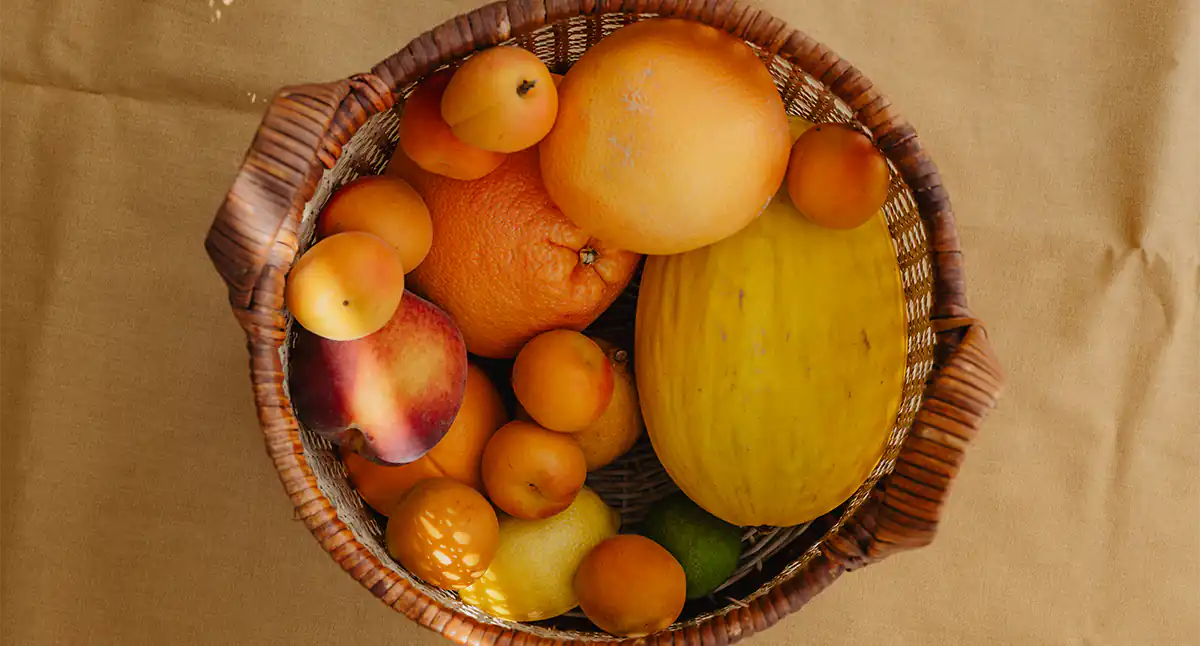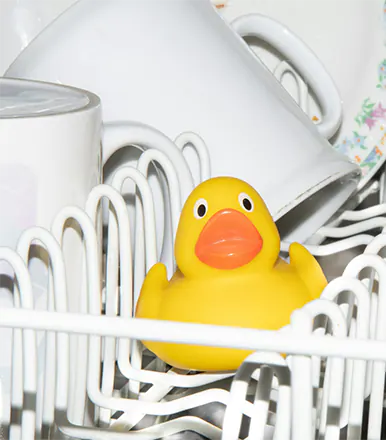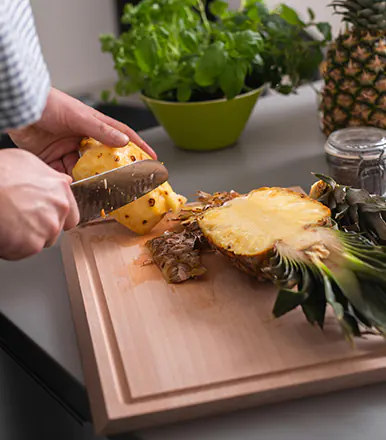From April to September, every time you enter your kitchen, an unpleasant sight greets you: fruit flies buzzing around your fruit and vegetable baskets.
You wonder how they invaded your home.
But don't worry, there are simple ways to eliminate them.
Simple daily actions prevent fruit flies from returning, and I'll detail them one by one. Success guaranteed!
Practical chapters
- Causes of fruit flies in a home
- My 5 preventive methods against fruit fly invasion
- My 2 ultra-effective anti-fruit fly tips ♦
- Complementary preventive measures
- FAQ preventive measures
- Established fruit flies: 5 effective natural methods
- FAQ natural solutions
- 4 natural anti-fruit fly traps
- FAQ natural traps
- Indoor plants: 5 natural anti-gnat treatments
- FAQ natural treatments
- 4 natural methods against larvae in drains
- FAQ drain cleaning
- Effective chemical solutions against fruit flies
- FAQ chemical solutions
What Attracts Fruit Flies to a Home?
Fruit flies are small insects attracted to heat and decomposing matter.
They lay many eggs and multiply quickly.
Even clean houses can be affected. So there's absolutely no guilt to be had!
- Your home's hygiene is not to blame.
These small diptera, also called "fruit flies" or drosophila, are mainly attracted to:
- Ripe fruits and vegetables left in the open air
- Sugary residues on countertops
- Moist soil of indoor plants
- Food scraps and uncleaned crumbs
- Uncovered garbage cans
- Stagnant water in sinks and drains
- Fermented liquids like wine or vinegar
The kitchen, sink, and humid bathrooms are their favorite spots.
They love places where they can feed and reproduce quickly.
Preventive Methods: Preventing Fruit Fly Invasion
Before a swarm of fruit flies sets in, here are my tested and approved prevention methods, of course.
The 5 daily anti-fruit fly reflexes
To prevent fruit flies from invading your home, I've identified 5 essential preventive methods that I've been testing successfully for years:
- Keep your house clean (as usual)
- Take out trash frequently (even daily)
- Store food in cool places
- Wash dishes immediately
- Don't leave stagnant water
Here are my tested tips that fruit flies disapprove of ☺️
Preventive tip 1: optimal waste management

I put my daily peelings and kitchen vegetable scraps in a small kraft paper bag (or other small bag serving as a garbage bin), and I throw it out every day, even after each meal during the hottest periods.
- Fruit flies neutralized guarantee!
They won't have time to feed or therefore to proliferate.
Preventive tip 2: smart food storage
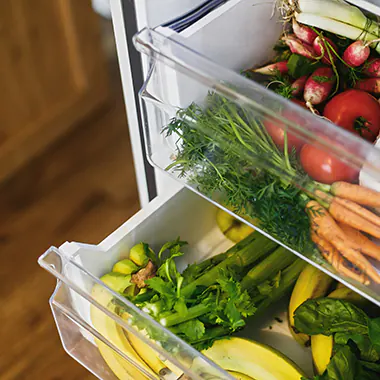
Even though it's not recommended to store all fruits and vegetables in the cool for reasons of slight nutritional degradation, I don't hesitate to put my market produce in the refrigerator during hot weather.
- I can certify that fruit flies never venture into cool temperatures...
When mealtime approaches, I take my vegetables and fruits out of the refrigerator a little beforehand, to avoid eating them too cold.
If you combine these methods, very few fruit flies will waste their time entering your home.
You'll have already eliminated +95% of their presence.
Indeed, primarily they only enter if they truly have access to plant food.
Complementary fruit fly prevention measures
- Store ripe fruits and vegetables in the refrigerator or in airtight containers as soon as you return from the market.
This prevents fruit flies from laying eggs on ripe fruits. - Always properly close your garbage cans especially if you compost.
Fruit flies love to hover around open garbage cans. - Rinse bottle bottoms of soda, wine, or beer to eliminate any smell of sugar and alcohol that could attract fruit flies.
- Empty saucers under plants. This is where they lay their eggs.
- In case of extreme necessity install screens on windows and doors to block their access.
FAQ - Fruit fly prevention
Why do my fruits attract fruit flies even if they're not rotten?
Fruit flies are attracted to ripe fruits even before they're visibly damaged.
Natural fermentation releases odors that attract them.
Do I really need to take out my trash every day?
During hot periods (spring-summer), I strongly recommend taking out organic waste daily.
This is the most effective preventive measure.
How do I know if water is stagnating somewhere in my home?
Check under sinks, around appliances, in plant saucers, and in drains.
Any persistent humidity can attract fruit flies.
Receive the best offers for your home, negotiated for you
Unsubscribe anytime. We promise, no misused or sold emails, we hate unsolicited mailings.Natural Solutions to Get Rid of Fruit Flies: Repellents and Grandmother's Remedies
If fruit flies have had time to invade the premises, you'll need to use methods to get rid of them as quickly as possible.
Fruit flies can quickly fill your space, especially when they've had time to settle in.
When prevention is no longer enough and fruit flies have already taken up residence in your home, I use effective natural methods that I've personally tested.
Here are my best natural anti-fruit fly tricks.
Natural anti-fruit fly solution #1:
citrus and spices
Lemon with cloves
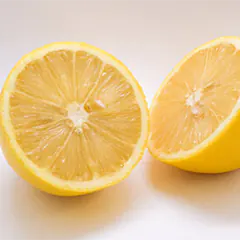
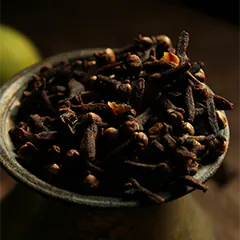
- I cut a lemon in half.
- I stick about ten cloves into the pulp.
- I place these lemons near infested areas.
- I replace them every 15 days.
- The acidity of lemon and the spicy smell of cloves create a powerful natural repellent.
Natural anti-fruit fly solution #2:
essential oils
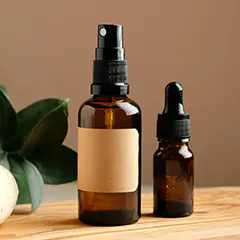
- I prepare a repellent spray with particularly effective essential oils:
— Java citronella: 20 drops
— True lavender: 20 drops
— Peppermint: 5 drops
— Eucalyptus: 5 drops - I dilute this mixture in 250 ml of water.
- I spray in the affected areas.
- This natural solution repels fruit flies while pleasantly perfuming the house.
Natural anti-fruit fly solution #3:
white vinegar

White vinegar is an excellent natural repellent.
- I mix it with water (1:1 ratio) in a spray bottle.
- I spray infested areas.
- Its strong smell repels fruit flies and its acidic nature can even eliminate them on contact.
Natural anti-fruit fly solution #4:
cork stoppers

- I place pieces of cork in my fruit baskets.
- Cork stoppers contain suberin, a natural substance that repels fruit flies thanks to its smell.
It's an ecological and sustainable solution.
Natural anti-fruit fly solution #5:
liquid black soap
More efficient than liquid castile soap if you're familiar with it.
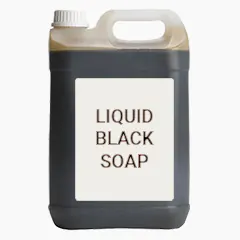
- I mix liquid black soap with water.
- I lightly spray this mixture on plants or areas of fruit fly activity.
- The adhesive properties of liquid black soap trap adult fruit flies and prevent larval development.
FAQ - Natural anti-fruit fly solutions
Are essential oils safe for children and animals?
I recommend using them diluted and in diffusion.
Avoid direct contact and keep out of reach of young children.
Some oils can be toxic to animals.
How long are natural remedies effective?
Natural repellents require regular renewal (every 3-7 days depending on the method) to maintain their effectiveness.
Can I combine several natural methods?
Absolutely!
I often combine several methods for maximum effectiveness, for example lemon-cloves + essential oil spray.
Homemade Anti-Fruit Fly Traps and Capture Techniques
Too much is too much?
When repellents are no longer enough, I move on to traps to capture the present fruit flies.
Try making these "homemade" anti-fruit fly traps.
They're simple to make and work well. Plus, they're good for the planet.
To catch fruit flies without chemicals, test my approved "recipes".
Homemade anti-fruit fly trap #1:
apple cider vinegar trap
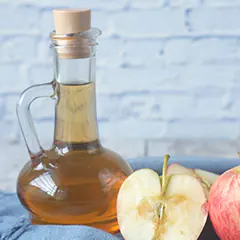
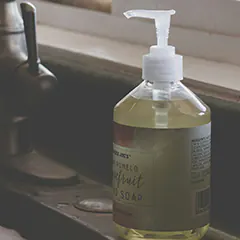
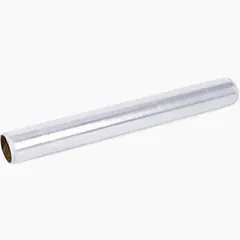
Here's my foolproof recipe:
- 100 ml apple cider vinegar
- 3 drops of dish soap
- perforated plastic wrap
- I pour the apple cider vinegar into a bowl or small dish.
- I add the dish soap which breaks the surface tension.
- I cover with plastic wrap in which I pierce small holes.
- Fruit flies are attracted by the fermentation smell of vinegar but can no longer get out because the dish soap captures them.
Homemade anti-fruit fly trap #2:
red wine trap


Now's the time to use that bottle of poor-quality red wine that a guest left you as a "gift" and that you'll never drink (we've all been there).
- I pour some red wine into a jar.
- I pierce small holes in the lid.
- The fermentation smell attracts fruit flies who get trapped inside and end up drowning.
Homemade anti-fruit fly trap #3:
honey trap
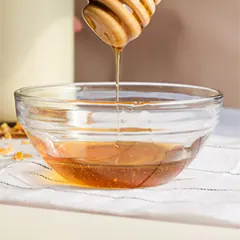
- I spread a thin layer of honey at the bottom of a small dish.
- I clean regularly to maintain effectiveness.
- Fruit flies land on the honey and get trapped by its sticky texture.
Homemade anti-fruit fly trap #4:
mixed trap
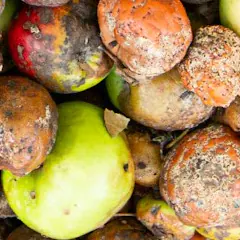
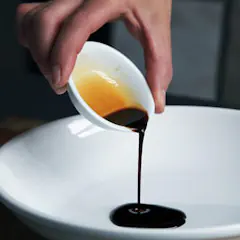


My most effective recipe combines:
- old crushed fruits
- balsamic vinegar
- honey
- perforated plastic wrap
- This combination multiplies attraction sources for an ultra-effective trap.
Tips for using anti-fruit fly traps
- Strategic placement
I position traps near infestation sources (fruit basket, sink, plants). - Renewal
I change the contents every 3-4 days. - Hygiene
I thoroughly clean containers between each use.
These ecological fruit fly trapping tricks are easy and they avoid chemicals.
They work very well in summer, during fruit fly season. They help make an effective fruit fly repellent.
FAQ - Homemade anti-fruit fly traps
Where to place anti-fruit fly traps for maximum effectiveness?
I position them 1-2 meters from infested areas, not directly on them.
Fruit flies are attracted by the bait but remain trapped before reaching their initial objective.
How long does it take to see results from anti-fruit fly traps?
Generally, I notice a notable decrease within the first 24-48h.
Complete elimination can take 1-2 weeks depending on the extent of the infestation.
My anti-fruit fly traps aren't working, what should I do?
Check that your baits are fresh and fragrant.
Sometimes, changing the location or combining several types of traps improves results.
Natural Treatments for Indoor Plants Against Gnats
Gnats love to lay eggs in the moist soil of indoor plants.
Here are my specific methods to treat this recurring problem.
Anti-gnat treatment #1 for indoor plants:
watering management
- I let the soil surface dry between waterings.
Gnats need humidity to lay their eggs.
- By controlling watering, I eliminate their preferred reproduction conditions.
Anti-gnat treatment #2 for indoor plants:
coffee grounds
- I sprinkle dried coffee grounds on the soil surface.
- It creates an environment hostile to egg laying while enriching the soil.
- Be careful to use it in moderation so as not to over-acidify the soil.
Anti-gnat treatment #3 for indoor plants:
protective layer
- I cover the soil surface with a thin layer of fine sand or clay pebbles.
- This physical barrier prevents gnats from laying eggs directly in the soil.
Anti-gnat treatment #4 for indoor plants:
soapy spray
- I prepare a mixture with:
— 1 tablespoon liquid black soap
— 500 ml warm water - I lightly spray this mixture on the soil.
- It eliminates present larvae without damaging plant roots.
Anti-gnat treatment #5:
emergency repotting
In case of severe gnat infestation on indoor plants, here's my technique.
I completely repot the plant by:
- removing the maximum of infested soil,
- cleaning the roots with clear water,
- disinfecting the pot with black soap,
- using new, quality soil.
FAQ - Plant treatment against gnats
How do I know if my plants have gnats?
You'll see small insects fluttering around the pots, especially when you move the plant.
The soil may also seem "alive" with small white larvae.
Do all soils attract gnats?
Soils rich in organic matter and poorly draining are more likely to attract gnats.
I favor quality soils with good drainage.
Can I treat plants against gnats with essential oils?
Yes, but with caution.
I dilute heavily (2-3 drops for 500 ml of water) and I test on a small area before complete treatment.
Drain Cleaning to Neutralize Fruit Fly Larvae
Drains are often overlooked sources of fruit fly infestation.
I'll explain how to treat them effectively.
Cleaning method #1:
baking soda-vinegar
Here's my preferred technique.
- I pour 100g of baking soda into the drain.
- I add 200ml of hot white vinegar.
- I let it act for at least 2 hours.
- I rinse abundantly with boiling water.
- This natural chemical reaction decomposes organic residues where fruit flies lay eggs.
Cleaning method #2:
regular boiling water
- Each week, I pour 2-3 liters of boiling water into all my sinks.
- This simple method eliminates eggs and larvae present in the drains.
Cleaning method #3:
trap dismantling
Every 3 months, I dismantle and clean the sink trap:
- I empty the residual water,
- I remove all food debris,
- I clean with black soap,
- I reassemble while checking the seal.
Cleaning method #4:
enzymatic products
- I sometimes use natural enzymatic products that "digest" organic matter in drains.
- They're ecological and very effective against sink fruit flies.
FAQ - Drain cleaning
How often should I clean drains to prevent fruit fly larvae?
I recommend weekly preventive cleaning with boiling water and monthly baking soda-vinegar treatment.
How to prevent residue accumulation in drains?
I place fine grilles on all my sinks and I always rinse abundantly after dishwashing to avoid grease accumulation.
Are chemicals necessary to clean drains?
Rarely.
The natural methods I use are generally sufficient.
In case of major blockage, I call a plumber.
Effective Chemical Solutions to Get Rid of Fruit Flies
When natural methods are no longer enough against massive infestation, I resort to targeted and safe chemical solutions.
Chemical anti-fruit fly solution #1:
specialized insecticide sprays
I choose sprays specifically formulated against fruit flies, more effective than generalist insecticides.
- I favor those based on natural pyrethrins, less toxic than organophosphates.
Safe use:
- I spray only in infested areas
- I ventilate abundantly after treatment
- I wear a protective mask
- I keep children and animals away for 2-4 hours
Chemical anti-fruit fly solution #2:
commercial pheromone traps
These traps use chemical attractants specific to fruit flies.
- They're particularly effective because they attract insects over long distances without dispersing products into the air.
Chemical anti-fruit fly solution #3:
automatic diffusers
For recurring infestations, I sometimes install automatic diffusers that release small amounts of insecticide at regular intervals.
- I use them as a last resort and never in main living spaces.
Chemical anti-fruit fly solution #4:
professional treatments
If other methods fail, I call a professional pest control specialist who has more powerful products and technical expertise.
Usage precautions
- Careful reading of labels and strict respect for dosages
- Secure storage out of children's reach
- Systematic ventilation of treated spaces
- Individual protection (gloves, mask) during application
FAQ - Chemical anti-fruit fly solutions
When to use chemicals?
Only after testing all natural methods, in case of massive infestation or uncontrolled recurring situation.
Are chemicals dangerous?
Used correctly according to instructions, risks are limited.
I always favor the least toxic formulations available.
Can I treat a large fruit fly infestation myself?
For significant infestations, I nonetheless recommend calling a professional who has the appropriate expertise and equipment.
What I can say in conclusion
All these repellent solutions and fruit fly traps will help your home stay healthy and fruit fly-free.
The key to success lies in a progressive approach: I always start with prevention, then natural methods, and only as a last resort chemical solutions.
If you want to get rid of fruit flies forever, follow these tips methodically. Combining several techniques considerably increases your chances of success.
Living in a fruit fly-free place is possible!
FAQ to get rid of fruit flies
How long does it take to completely eliminate fruit flies?
With a methodical approach, you should see improvement in 3-5 days and complete elimination in 1-2 weeks maximum.
Can fruit flies transmit diseases?
Domestic fruit flies generally don't transmit serious diseases, but they can contaminate food with bacteria.
Why do fruit flies keep coming back?
Often because the source of the problem hasn't been treated (drains, moist soil, hidden fruits).
You must identify and eliminate all breeding areas.
What time of year are fruit flies most numerous?
From April to October, with a peak in July-August.
Heat and humidity favor their rapid reproduction.
Can we totally prevent fruit fly appearance?
With good hygiene and storage practices, you can considerably reduce their presence, but total eradication is difficult during favorable periods.
Do fruit flies bite?
No, fruit flies do not bite humans.
They are non-aggressive insects that feed primarily on fermenting organic matter, sugary substances, and overripe fruits.
Unlike mosquitoes or other biting insects, fruit flies lack the mouthparts necessary to bite or sting.
They are simply a nuisance due to their presence and potential for contaminating food, but they pose no direct physical harm to humans through biting.
How long do fruit flies live?
Adult fruit flies typically live for about 8-10 days under normal household conditions, though this can extend to 2-4 weeks in cooler temperatures.
However, their rapid reproduction cycle is what makes them problematic - a female fruit fly can lay up to 500 eggs during her lifetime, and these eggs can develop into adults in just 7-14 days under optimal conditions (warm temperatures and abundant food sources).
This means that even though individual fruit flies have short lifespans, populations can explode quickly if not controlled.
Are gnats and fruit flies the same?
While gnats and fruit flies are both small flying insects often found in homes, they are not exactly the same.
Fruit flies (Drosophila) are specifically attracted to fermenting fruits, vegetables, and sugary substances in kitchens.
Gnats is a broader term that includes several types of small flies, including fungus gnats that are commonly found around houseplants where they breed in moist potting soil.
Fungus gnats are typically darker and more slender than fruit flies, and they're attracted to the organic matter and moisture in plant soil rather than food.
Both can be household nuisances, but they require slightly different treatment approaches - fruit flies need food source elimination, while gnats around plants need soil moisture management.


